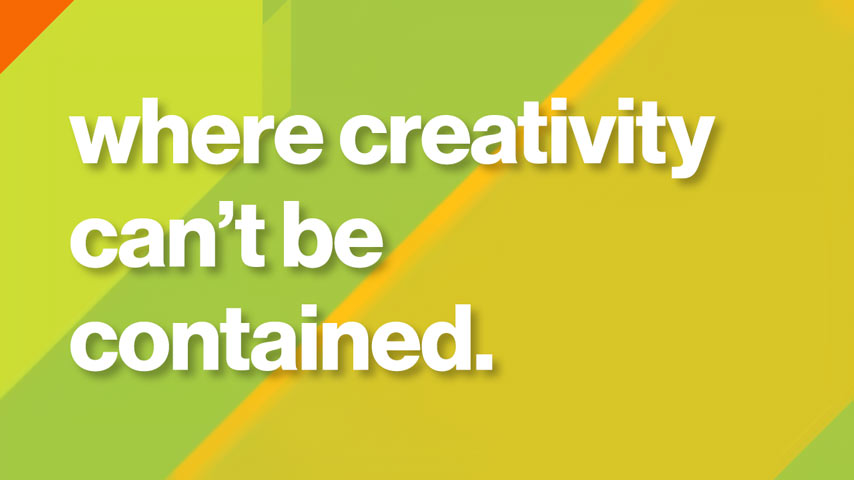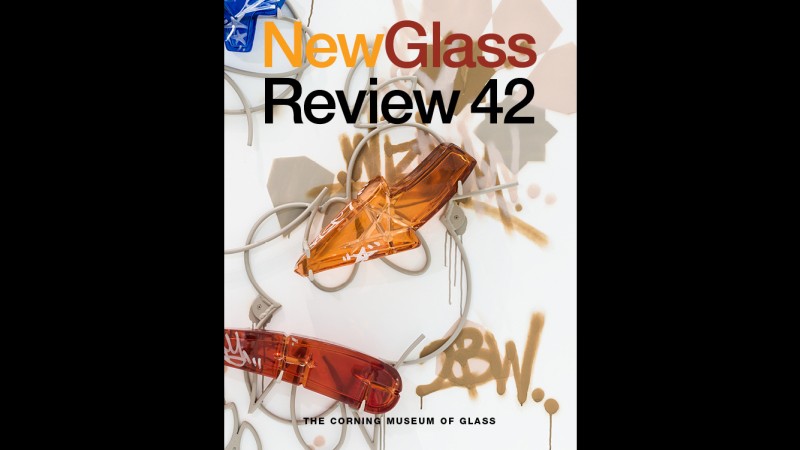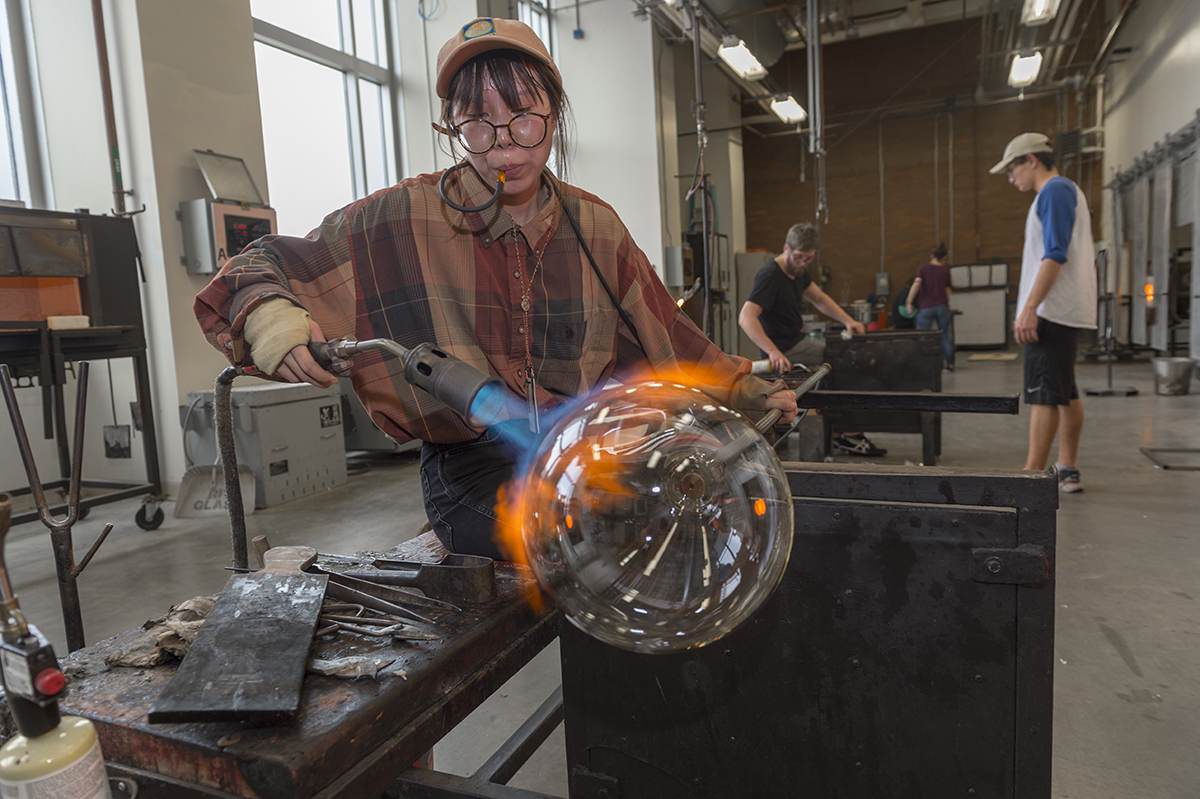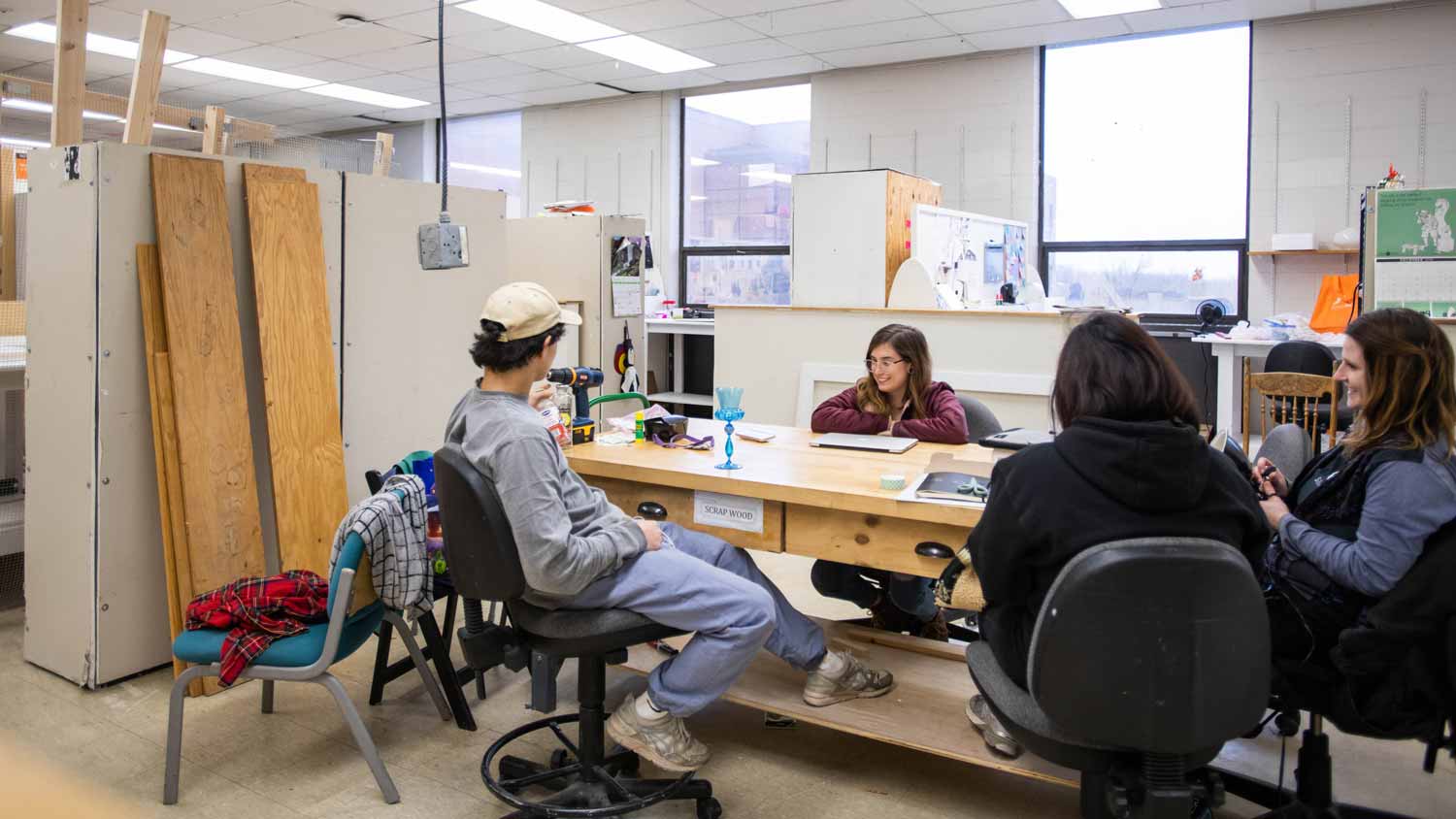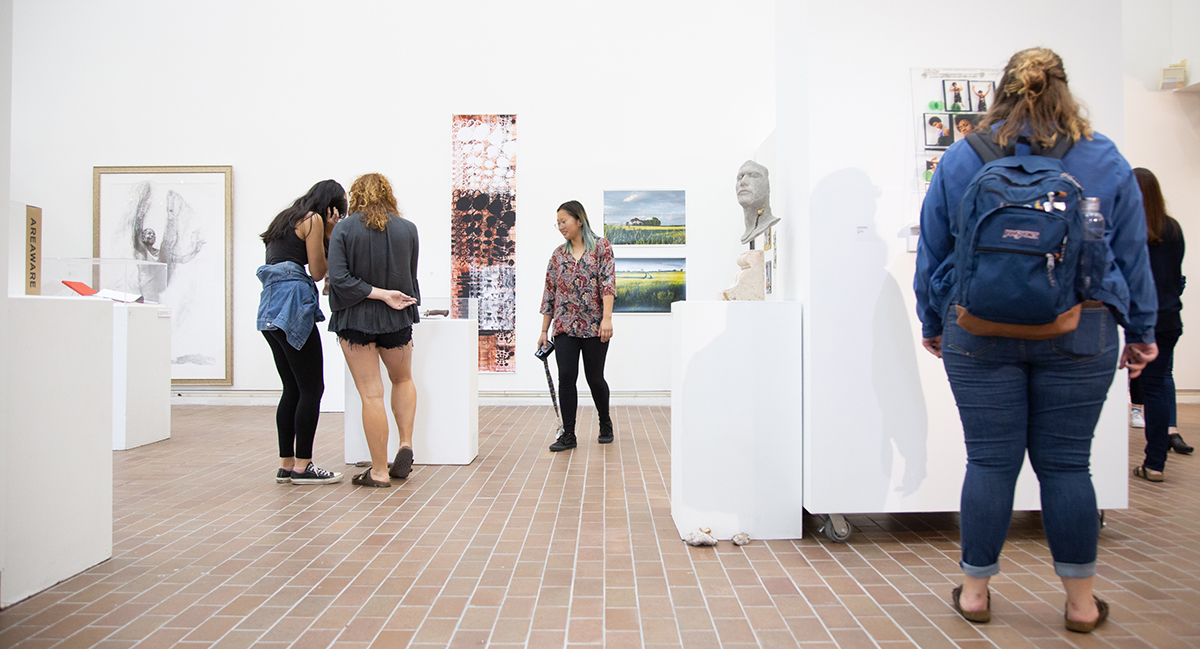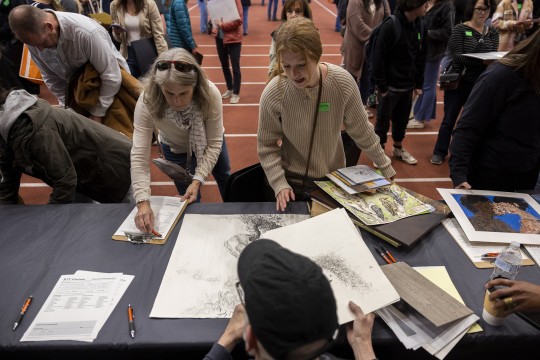Glass Option - Studio Arts BFA
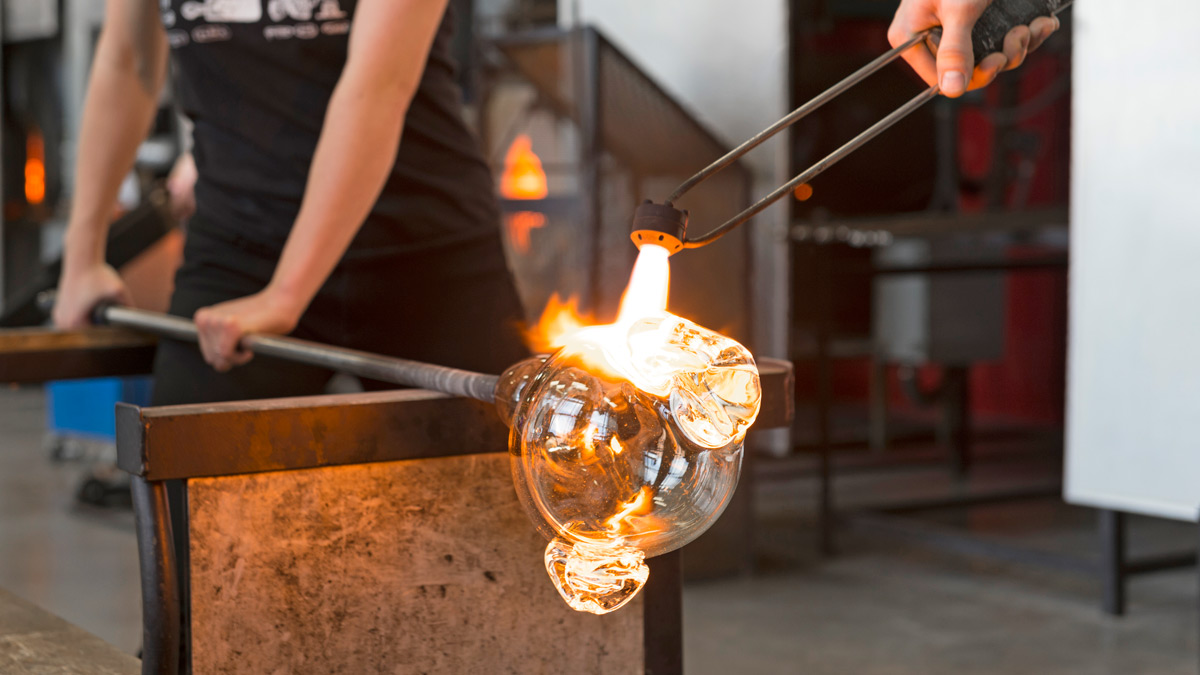
Glass Option
Studio Arts BFA
- RIT /
- Rochester Institute of Technology /
- Academics /
- Glass Option - Studio Arts BFA
Expand your interest with a glassblowing degree emphasizing research, idea development, and material exploration to ensure professional success.
Overview for Glass Option - Studio Arts BFA
Why Study Glass Studio Arts at RIT
College Preparation Workshops: High school juniors and seniors can participate in the two-week School of Art's annual Pre-College Portfolio Preparation Workshop.
Exhibit your Work: During senior year, your final body of work will be featured in a gallery.
This BFA glass degree cultivates artists who are as versatile in their making as they are in their thinking. This option is part of the studio arts BFA program.
RIT’s Studio Arts BFA- Glass Option
RIT’s glassblowing major offers a rigorous and diversified curriculum that cultivates artists with diversified and informed creative potential with glass in:
- Glassblowing
- Flame-working
- Hot and kiln casting
- Cold-working
- Kiln-forming
- Glass imaging processes
- Three-dimensional digital technologies
Students are equipped with the skills needed to succeed as professionals with an emphasis placed on:
- Research
- Idea development
- Material exploration
- Execution
- Presentation
Studio Residency Program
The glass option also offers a Glass Studio Residency Program for artists interested in pursuing glass-related research at RIT.
Careers and Experiential Learning
Typical Job Titles
| Artistic Director | Creative Director | Independent Artist |
| Small Business Owner/Operator | Professional Artist Assistant | Professional Designer |
| Professional Gaffer | Professional Fabricator | Freelance Artist Assistant |
| Freelance Designer | Freelance Fabricator | Freelance Gaffer |
| Gallery Director | Gallery Preparator | Exhibition Curator |
| Studio Technician | Studio Technician Assistant | Professional Hot Shop Employee |
| Professional Kiln Studio Employee | Professional Cold Working Employee | Education Director |
| Glass Education: High School Teaching | Glass Education: Undergraduate/Graduate Teaching | Glass Education: Public Access Studio Teaching |
| Glass Education: Public Demonstration/Narration for Museums, Art Centers, Education Centers | Glass Education: Material Study Workshop Teaching | Glass Education: Registrar/Administration |
| Glass Industry: Architecture | Glass Industry: Scientific Instrumentation | Glass Industry: Equipment/Tool Manufacturing |
Industries
-
Performing and Fine Arts
-
Higher Education
-
Design
-
Museum
Cooperative Education and Internships
What’s different about an RIT education? It’s the career experience you gain by completing cooperative education and internships with top companies in every single industry. You’ll earn more than a degree. You’ll gain real-world career experience that sets you apart.
Co-ops and internships take your knowledge and turn it into know-how. Your art and design co-ops will provide hands-on experience that enables you to apply your artistic capabilities in dynamic professional settings while you make valuable connections between classwork and real-world applications.
Students in the glass option are strongly encouraged to complete a cooperative education or internship experience.
Creative Industry Days
Connect with Design Industry Leaders
RIT’s Office of Career Services and Cooperative Education hosts Creative Industry Days, which connects students majoring in art, design, film and animation, photography, and select computing majors with companies, organizations, creative agencies, design firms, and more. Creative Industry Days are a series of events that allow you to network with company representatives and interview directly for open co-op and full-time employment positions.
Featured Work and Profiles
-
Molten Glass 3D Printer
RIT's glass program hosted the artist/designer/engineer team behind Evenline as artists in residence for the spring 2023 semester. The innovative company stationed its only-one-of-its-kind molten...
Read More about Molten Glass 3D Printer -
Faculty featured in 'New Glass Review'
David Schnuckel, Suzanne Peck RIT glass faculty Suzanne Peck and David Schnuckel were both selected for the 42nd issue of New Glass Review, the Corning Museum of Glass’ flagship publication showcasing 100 timely, innovative glass...
Read More about Faculty featured in 'New Glass Review' -
Rewriting the language of glass art
Suzanne Peck Suzanne Peck, lecturer of glass, was featured in "New Glass Now," a group exhibition organized by the Corning Museum of Glass that features innovative works by artists and collectives around...
Read More about Rewriting the language of glass art -
Pre-College Portfolio Prep Workshop
RIT's annual Pre-College Portfolio Preparation Workshop offers students an engaging and rewarding experience. The course, taught by our School of Art's drawing and painting faculty, is a visual arts...
Read More about Pre-College Portfolio Prep Workshop -
School of Art Reel
No matter your medium, a world of possibility awaits in RIT's School of Art.
Read More about School of Art Reel -
Glass-Color Science Collaboration
A hallmark of RIT's Glass BFA option and MFA program is forming enriching multidisciplinary partnerships — including with the Munsell Color Science Lab on campus.
Read More about Glass-Color Science Collaboration
Admissions and Financial Aid
This option is part of the Studio Arts BFA. Please visit the degree program page for admission requirements.
Financial Aid and Scholarships
100% of all incoming first-year and transfer students receive aid.
RIT’s personalized and comprehensive financial aid program includes scholarships, grants, loans, and campus employment programs. When all these are put to work, your actual cost may be much lower than the published estimated cost of attendance.
Learn more about financial aid and scholarships
Related News
-
June 3, 2024
![Spider Martins leads a performance in RIT's glass hot shop.]()
Recent glass graduate continues RIT trend of Windgate-Lamar Fellowship recipients
Spider Martins ’24 (studio arts BFA - glass option) is a Windgate-Lamar Fellowship nominee for their work incorporating themes of personal identity and challenging the notion of what constitutes “high craft.”
-
March 21, 2024
![A student binds a book in the textile makerspace in the SHED.]()
Innovation unleashed: students forge transdisciplinary projects at RIT's a2ru summit
Students leveraged the variety of makerspaces in RIT's brand-new SHED facility to create arts-integrative work responding to a theme of "Play."
-
November 6, 2023
![A student has her artwork reviewed by faculty member Don Arday.]()
Prospective students explore RIT art and design programs at National Portfolio Day event
The College of Art and Design welcomed 226 young artists to campus for its National Portfolio Day event, where prospective students met one-on-one with faculty about their artwork and different programs.
Contact
School of Art









